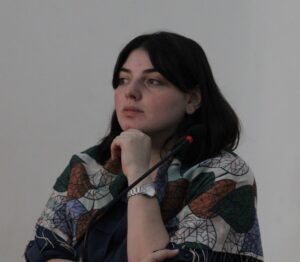- Thank you for accepting our invitation to serve as a keynote speaker at the Fourth International Conference – Terminology – Heritage and Modernity. Since this is your first time visiting Georgia, we’re interested to know what you know about our country.
I would like to begin by expressing my gratitude for your kind and unexpected invitation to serve as a keynote speaker. I am also grateful for the opportunity to visit your beautiful country and to see you and your colleagues in person.
As for Georgia, I know that it’s blessed with spectacular mountains and warm sea, beautiful landscapes, friendly, kind and very hospitable people, delicious food (like khachapuri and chinkali) and fine wine, rich history and interesting customs. I believe that during this visit I will be able to get a taste of your charming country and feel its spirit.
I know that Lithuanians are very fond and respectful of Georgians, and Georgians of Lithuanians. I was pleasantly surprised to learn that there is a square in Tbilisi named after Lithuania’s capital.
And recently I found out that the Georgian team is taking part in the European Football Championship (UEFA Euro 2024) for the first time. I wish your team all the best!
- As far as I know, Lithuania was the only one of the Baltic countries to maintain its language research institute after leaving the Soviet Union. Today, there might be opportunities for analyzing this further. What advantages do you see in having a language research institute in the country?
The Institute of the Lithuanian Language (LKI) is the leading institution for research on the Lithuanian language not only in Lithuania, but also worldwide. I would like to emphasize that it is also the centre of the most important Lithuanian language resources.
The Institute is the only institution that conducts comprehensive research on all levels of the Lithuanian language and linguistic heritage. This is its strength and its greatest advantage. Certainly, research on the Lithuanian language is also carried out at universities, but there it is usually more fragmented or more often confined to specific projects of limited duration. Some areas of Lithuanian language research (terminology, lexicography, neology, geolinguistics, onomastics, etc.) are consistently developed only at the Institute.
The Institute also acts as an expert institution on language policy issues, advises on problematic language matters.
- Is there any challenge in terminological work in Lithuania, considering the existence of a terminological policy, coordinated terminological efforts, normative terminology development, the Lithuanian term bank, and terminological research?
Lithuanian terminology is quite well managed at the state level. We can boast a national term bank (https://terminai.vlkk.lt/) – the main terminological data bank for the Lithuanian language (since 2004) with a legal framework (the Law on the term bank and Methodology, not to mention other related legislation).
Thus, the existing system of terminology management at national level needs to be maintained and strengthened. And that requires both financial and human resources. Despite the advantages of managing terms through the Term Bank system, there are also challenges in the national terminology workflow. More participants should be involved in the terminology workflow – domain experts (researchers and practitioners), translators, linguists. Corpus-based terminology management could be used to some extent. Although the Term Bank is a reliable terminology database, the increase of terminological data is slow in terms of quantity and domain coverage. Some of the terminology collections included in the Term Bank (e.g. data from dictionaries) are already somewhat outdated.
It is a regret that research policy in Lithuania does not support the creation, maintenance and usage of Lithuanian terminology. Publication of research results in foreign journals and publishing houses is encouraged, resulting in publications (and terminology) in languages other than Lithuanian (especially English). Lithuanian higher education institutions are moving more and more towards teaching in English. The compilation of terminological dictionaries or other terminology collections is poorly valued as an R&D activity. It is not surprising that the number of dictionaries produced has declined significantly in recent years (cf. 2 dictionaries in 2022, 11 in 2012, 19 in 2002).
As far as terminology research is concerned, it is difficult to attract young people to study terminology. And few researchers regularly conduct Lithuanian terminology research. It is challenging to get funding for larger terminology research projects that would bring together domain experts, language technologists and linguists. There is a lack of available language technologies, language analysis tools suitable for the investigation of Lithuanian terminology. For example, the well-known and widely used “Sketch Engine” has not yet offered POS tagging, lemmatisation, term extraction, word sketch tools for the Lithuanian language.
Another challenge is the need for terminology education. There is still a perception in Lithuanian society that linguists are solely responsible for terminology in all fields.
- What is your approach to the nature of terminology: do you prefer to accept English neologisms untranslated, or do you favor terms derived from Lithuanian roots?
Lithuanian terminology has always been guided by the principle of preference for native language. However, applying this principle does not mean rejecting international terms or replacing all borrowings with Lithuanian equivalents. As K. Gaivenis, a renowned Lithuanian terminologist, said, “It is difficult to avoid borrowings in terminology. On the other hand, it is not necessary to avoid them too much”. In accordance with the principle of preference for native language, Lithuanian equivalents are proposed in place of a borrowing, and whether these equivalents are accepted and come into usage depends on various factors: linguistic, pragmatic, socio-psychological, aesthetic. For example, a number of Lithuanian equivalents were proposed for English file, and for some time these equivalents were used (byla, rinkmena), but eventually the borrowing failas (orthographically and morphologically adapted form) prevailed. When it is difficult to find a proper Lithuanian equivalent, the borrowing is not avoided, e.g. the borrowing botnetas has become a term. It is more difficult for a Lithuanian term to become established when the Lithuanian equivalent of a single-word English term is an attributive phrase (especially a longer one).
Lithuanian is a morphologically rich language, and its morphological derivation is highly developed. Therefore, Lithuanian single-word terms are not only more transparent than anglicisms, but the means of derivation help to meet the requirement of linguistic systematicity of terms. For example, the names of computer programs are formed with the suffix –yklė: naršyklė (browser), braižyklė (drawing program), piešyklė (paint program), vertyklė (translator), etc.
- What contribution does your institution make to the development of artificial intelligence?
The Institute of the Lithuanian Language contributes to the development of artificial intelligence indirectly by developing large-scale digital resources that can be used to train AI models. As is well known, high-quality language resources are of great importance for AI.
 Linda Giorgadze
Linda Giorgadze
Research fellow at TSU Arnold Chikobava Institute of translating dictionaries and scientific terminology.


